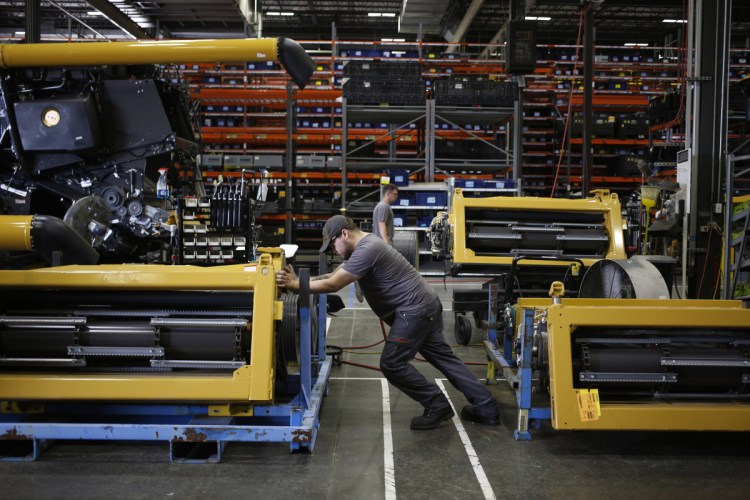A Nebraska city with more job listings than applicants has extended a special offer to employers: It will match signing bonuses for out-of-town hires of up to $5,000.
A county in Michigan is advertising $15,000 payouts to STEM graduates who decide to live in its rural expanses.
And the state of Vermont recently approved a fund to pay $10,000 to employees who relocate there.
This is America’s bidding war for workers, an emerging feature of the increasingly tight labor market from the Midwest to the Northeast. Creative twists on recruitment are popping up as the nation’s unemployment rate keeps sinking. The figure hit an 18-year low of 3.8 percent in May.
Megan McGown, vice president of economic development and marketing at the North Platte Area Chamber and Development, said her Nebraska city – population roughly 24,000 – needs people to work in factories, warehouses, medical centers and the railroad. About 500 jobs sit open.
“Those who can work are working, so we’re always in need of additional people,” McGown said. “You can’t drive around town without seeing a ‘help wanted’ sign.”
North Platte’s population hasn’t budged much since 2004. Under this pressure, business leaders and members of the City Council hatched plans to lure more people to town.
First, they offered $12,000 checks to developers for each new house, since they figured continued growth in the area’s health-care and manufacturing industries required more lodging. Then they agreed to match signing bonuses paid to new employees from out of town by up to $5,000. So far, two people have received the bonuses – both for a total of $10,000: a lawyer and a physical therapist. Workers must make at least $20 an hour to be eligible.
The program is funded through a half-cent sales tax. The levy, which was imposed last March, sparked no backlash in the community, McGown said.
“People don’t want to see companies move away because they can’t find workers,” she said.
In Vermont, lawmakers passed a bill in May to pay $10,000 to people who move to the state and work remotely. The law goes into effect in January. Supporters say the plan is designed to attract young mobile employees who have the flexibility to take the leap, decide to stay, have families and patronize businesses.
“We have about 16,000 fewer workers than we did in 2009,” Gov. Phil Scott said in a statement. “We must think outside the box to help more Vermonters enter the labor force and attract more working families and young professionals to Vermont.”
The state has received more than 1,400 inquiries about the assistance, a spokeswoman said. Vermont has earmarked $125,000 for the program’s first year.
In St. Clair, Michigan, a lakeside county of roughly 160,000 people, business leaders teamed up with the local chamber of commerce to raise $100,000 to lure recent STEM graduates to the community about 40 miles north of Detroit. The major industries are health care and manufacturing.
“We spend a lot of money on traditional scholarships that aren’t bringing people back home,” said Randy Maiers, chief executive of the Community Foundation of St. Clair. “Why don’t we pay people to move back here?”
People who have graduated within the last seven years with STEM degrees are eligible for $15,000 awards to cover their student debt.
They call the effort “reverse scholarships,” Maiers said.
St. Clair’s initiative has so far persuaded 10 workers with an average of $79,000 each in student debt to relocate to the area: a veterinarian, an athletic director, teachers and medical workers.
Maiers said the local economic development team is now talking to community leaders in Ohio and West Virginia about how to replicate the program.
Copy the Story LinkSend questions/comments to the editors.



Success. Please wait for the page to reload. If the page does not reload within 5 seconds, please refresh the page.
Enter your email and password to access comments.
Hi, to comment on stories you must . This profile is in addition to your subscription and website login.
Already have a commenting profile? .
Invalid username/password.
Please check your email to confirm and complete your registration.
Only subscribers are eligible to post comments. Please subscribe or login first for digital access. Here’s why.
Use the form below to reset your password. When you've submitted your account email, we will send an email with a reset code.